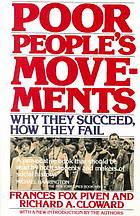Table Of ContentPO OR
PIOPLE’s
MOV E
MEN'IS
WHY THEY SUCCEED,
How THEY FAILM
J '_ , ,1. ‘
‘5" 4' (t! A$. £x
_ s“;- 1 'M'.0k th OUld bk 1.;1-5
'|NQTON st.‘
rHr NEWYOR IMISBOOK REVw -\
FRANCES FOX PIVEN AND
RICHARD A. CLOWARD
WITHANEWINTRODUCTION BYTHE AGTHORS
POOR PEOPLE’S
MOVEMENTS
Why They Succeed,
HOWThey Fail
by
FRANCES FOX PIVEN
and RICHARD A. CLOWARD
VINTAGE BOOKS
ADivisionofRandom House -NewYork
Grateful acknowledgmentismade to the followingforpermission toreprint previously
publishedmaterial:
The Antioch Press: Excerpts from “Kennedy in History: An Early Appraisal" by
William G. Carleton. Copyright © I964by the Antioch Press. First published in The
AntiochReview,vol.24,no.3.Reprinted bypermissionoftheeditors.
Delacorte Press: Excerpted verse from Toil and Trouble by Thomas R. Brooks.
C0pyright © 1964by ThOmas R. Brooks.Reprinted by permission of Delacorte Press.
Fartune: Quotation fromFortune,Fall1931.
Greenwood Press.Inc.: Excerpt from WoridRevolutionary Propaganda by Harold D.
Lasswelland Dorothyllumenstock. Usedwith the agreementof the reprint publisher,
Gr'eemsoodPress.Inc.
Lexington Books:Bread orJustice by Laurence Neil Bailis.Reprinted bypermission
of Lexington Books,D.C.Heath and Company, Iexington, Mass, 1974.
Lexington Books and The Rand Corporation: Prolexts by the Poor by Larry R.
jackson and William A.Johnson. Reprinted by permission of Lexington Books.D. C.
Heath andCompany,Lexington, Mass, 1974,and The Rand Corporation.
George T. Martin, Jr; EXCCI‘ptfSrom "The Emergence and Development of a Social
Movement Organization Among the Underclass: ACaseStudy of the National Welfare
Rights Organization" by George T. Martin, Jr., Ph.D. dissertation, Department of
Sociology.UniversityofChicago, 1972.Reprinted bypermission.
Monthly Review Press: Excerpts from Rosa Lnxemburg's Selected Writings, edited
byDickHoward. Copyright. 1971byMonthly ReviewPress.Reprinted bypenniSsion
ofMonthly ReviewPress.
The Nation: "No Rent Money...1931”byHorace Cayton in the September 9. 1931.
issue and “Labor 1975:The Triumph of BusinessUnionism" by B.]. Widick in the
September 6,1975issue.
National Welfare Rights Organization: Excerpt from the “Natimial Welfare Rights
OrganizationNewsletter.”Reprinted bypermission
The New American Library, Inc. Excerpts from Lyndon B.Johnson: The Exercise
of Power by Rowland Evansand Robert Novak.Copyright © 1966by Rowland Evans
and Rohert Novak.Reprinted byarrangement with The New AmericanLibrary, Inc.,
NewYork,N.Y.
The NewYorkTimes Company: Excerpt from March 6, 1930,Febniary 2,1932,and
juue I6. 1963,issues.Copyright © 1930,1982.1963byThe New YorkTimes Company.
Reprinted bypennission.
Radicai America: "Personal Histories of the Early C10" by Staughton Lynd from
the Mny—june1969155111v3o,l. 5,n0.3.Copyright © 1959byRadical America.
United AutoWorkersandJane Sugar:Fourlinesoflyricsattributed to MauriceSugar.
Chief Counsel forUnited AutoWorkers. [937—1948.
VintageBooksEdition,January [979
Copyright© 1977byFrancesF0xPivenandRichard A.C101tard
Allrigi'ii‘sreserved _underInternational and Pan-American Copyright Conventions. Pub
lished1ntheUnited States_byR,andomHouse, Inc. NewYork,and inCanadabyRandOm
Houseoszi'nda Limited,Toronto OriginallypublishedbyPantheon BooksinNovember
-.1977.
Library ofCongIESSCataloging inPublication Data
Piven,FrancesFox.
Poorpeople’smovements.
Includesbibliographiesandindex.
1.Labor and laboringclasses—UnitedStates—Politicalactivity
History. 2. Afro-Americans—Civilrights-History.
3.Welfareriglitsmoyement—United States—History.
I. Cloward,Richard A.,joint author. [1.Title.
[HD8076.P55 I979] 322.4’4'0973 78-54652 ISBN0-89172697-9
Manufactured intheUnited StatesofAmerica
C9876
ACKNOWLEDGMENTS
We would like tothank BertDeLeeuw, Murray Edelman,
MarkNaison, BillPastreich,and Howard Zinn forreading
andcommenting on thismanuscript atvarious stagesin its
preparation. Andour particular thankstoS.M.Miller,who
both encouraged ustowrite thisbookand introduced usto
GeorgeWiley.
CONTENTS
INTRODUCTION ix
Chapter I The Structuring ofProtest 1
Chapter 2 The Unemployed Workers’ Movement 41
Chapter 3 The Industrial Workers’ Movement 96
Chapter 4 The Civil Rights Movement 181
Chapter 5 The Welfare Rights Movement 264
INDEX 363
ABOUT THE AUTHORS 383
Introduction to the
Paperback Edition
In thereviewsthatappeared during theinterval betweenthepublica»
tion of the hardcover and the paperback editions of Poor People's
Movements,a number ofcritics took issuewith some of the conclu
sionswereached.In thisbriefintroduction tothe paperback edition,
wetaketheopportunity ofcontinuing thedebate.l
Perhapsthesingular contribution of theintellectual tradition ofthe
left,asithasdevelopedsincethenineteenth century,hasbeentobring
working-classpe0ple fully into history, not simply asvictims but as
actors. The left bas understOodthat working-classpeople are a his
torical forceand could becomeagreater historicalforce.And the left
hasunderstood that thedistinctiveform in whichthat forceeXpresses
itselfisthe massmovement.
In theory,thelefthasalsounderstood thatworking-classmovements
are not forged merely bywilling or thinking or arguing them into
existence.Proletarian movements,Marxsaid,areformedbyadialecti
calprocessreflectingtheinstitutional logicofcapitalist arrangements.
The proletariat isa creature, not ofcommunist intellectuals,but of
mpital andtheconditionsofcapitalistproduction, apoint emphasized
inthe CommunistManifesto:
1n prOportion as the bourgeoisie, i.e., capital, is deve10ped, in the
same pr0portion is the proletariat, the modem working class, de'
veloped ...[and] .. .notonlyincreasesin number; itsstrength grows,
and itfeelsthat strength more....Ofall theclassesthat stand faceto
lThe followingreviewsarereferred tointhe text:jack Beatty,TheNation,October8.
1977:1. Barton Bernstein, The Chronicie of Higher Education, March 27. 1978;Carol
Brightman, SevenDay:,January 1978:Michael Harrington. The New York Times Book
Review,December ll. 1977;E.I. Hobsbawm, The NewYorkReviewofBooks,March 23.
1978;and PaulStarr,WorkingPapers,March/Apri11978.
ix
Introduction x
facewith the bourgeoisie today.the proletariat atom isareally revo
lutionary class.The Otherclassesdecayand finally disappear in the
faceof Modern Industry; the proletariat is its Specialand essential
product.
Of course,historical developments frustrated Marx’sprediction: ex
panding capitalist production did not create a revolutionary pro
letariat.
Still, the basic mode of dialectical analysis underlying the failed
prediction—the idea that the strugglesof ordinary people are both
formedbyand directed againstinstitutional arrangements—iscorrect.
The prediction failedbecauseMarxdid not anticipate thespeci6cin
stitutional patterns whichevolvedunder modem mpitalism, nor did
he anticipate the particular forms of struggle which would be gen
eratedinreactiontothem.Theseinstitutional arrangementsinhibited
theemergenceofaunifiedandrevolutionary workingclass:thespread
ofimperialism helped toproduce thesurplusesthat would raisework
ing-classmaterial standardsinthemothercountries; thebalkanization
of modern industry helped to fractionalize the working class; new
institutions such as public education helped to ensure capitalistic
ideological hegemony. In turn, these institutional arrangements
shaped the character ofworking-classresistance.Contemporary work
ing-classstrugglesarefragmented where the left wishesforunity, and
working-classdemands arereformist wheretheleft prescribesaradical
agenda.
But the intellectual left hasfailed toconfront thesedevelopments
fully, at leastin itsposture toward movements in industrial societies.2
It has failed to understand that the main features of contemporary
popular strugglesarebothareflectionofaninstitutionally determined
logicand achallenge to that logic.It hasclung instead to the specific
nineteenth-century content of the dialectic, and by doing so, has
forfeited dialectical analysis.Insofar ascontemporary movements in
industrial societiesdo not take the formspredicted byan analysisof
nineteenth-century capitalism, the left has not tried to understand
thesemovements,but rather hastended simplytodisapproveof them.
The wrongpeoplehavemobilized,fortheyarenottruly theindustrial
2By contrast, left-wing analysesof peasant movements are oriented precisely toward
understanding the influenceof specificsocietalarrangements on thosemovements.with
a measure of insight that perhaps benetits from the relative absenceof nineteenth
century Mantis: thought 0n thesubject.See.forexample,ErichR.Wolf,Peasant Warsof
the Twentieth Century (NewYoxk:Harper and Row, 1969),or James C.Swtt. The
MoralEconomyofthePeanut (NewHaven.Conn: YaleUniversityPress,1976).

